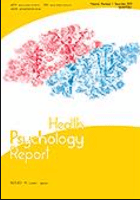
APPLIED PSYCHOPHYSIOLOGY AND BIOFEEDBACK
Scope & Guideline
Unveiling the Science Behind Human Behavior.
Introduction
Aims and Scopes
- Heart Rate Variability (HRV) Research:
A significant portion of the journal’s articles explore the relationship between heart rate variability and various psychological and physiological conditions, emphasizing its role as a biomarker for stress, anxiety, and overall health. - Neurofeedback Applications:
The journal features studies on neurofeedback, particularly its applications in treating conditions like ADHD, PTSD, and anxiety disorders, showcasing innovative methods and their impacts on cognitive and emotional functioning. - Biofeedback in Clinical Populations:
Research often investigates biofeedback interventions in clinical settings, including chronic pain management, stress reduction, and rehabilitation, with a focus on patient outcomes and adherence. - Integration of Technology in Biofeedback:
Papers frequently discuss the use of wearable devices and technology-enhanced biofeedback methods, reflecting a trend towards innovative, accessible interventions for health monitoring. - Mind-Body Interventions:
The journal also publishes studies on mind-body practices, such as meditation and yoga, and their effects on physiological measures, showing a holistic approach to health and wellness.
Trending and Emerging
- Heart Rate Variability Biofeedback:
Recent publications increasingly focus on HRV biofeedback interventions across diverse populations and contexts, indicating a growing recognition of its efficacy in enhancing mental health and well-being. - Integration of Biofeedback with Technology:
There is a notable trend towards studies that explore the integration of biofeedback with wearable technology and mobile applications, suggesting a shift towards more accessible and user-friendly interventions. - Neurofeedback and Cognitive Enhancement:
Emerging research emphasizes neurofeedback's role in cognitive enhancement and performance improvement, particularly in athletes and individuals with cognitive impairments, reflecting a burgeoning interest in optimizing mental processes. - Mindfulness and Relaxation Techniques:
The journal is increasingly publishing studies on the effectiveness of mindfulness-based interventions and relaxation techniques, often in conjunction with biofeedback, highlighting a holistic approach to mental health. - Use of Biofeedback in Diverse Clinical Contexts:
There is a growing trend of applying biofeedback methods to a wider range of clinical settings, such as cardiovascular health, chronic pain, and stress management, indicating the versatility and relevance of biofeedback in contemporary healthcare.
Declining or Waning
- General Psychophysiology Studies:
There appears to be a decreasing emphasis on broad psychophysiological studies that do not incorporate specific interventions or applications, as the journal increasingly favors targeted research on biofeedback techniques. - Traditional Physiological Measurements:
Research relying solely on traditional physiological metrics without integrating biofeedback or neurofeedback approaches has diminished, as the field moves towards more innovative and interactive methodologies. - Non-Clinical Populations Studies:
There has been a noticeable reduction in studies focusing on non-clinical populations, as the journal shifts its attention towards clinical applications of biofeedback and neurofeedback, indicating a more specialized research focus.
Similar Journals

CURRENT PSYCHOLOGY
Connecting Theory and Practice in Modern PsychologyCURRENT PSYCHOLOGY is a renowned journal published by SPRINGER, focusing on a myriad of topics within the field of psychology. With its ISSN 1046-1310 and E-ISSN 1936-4733, this journal has established a significant footprint since its inception in 1981. Based in the United States, at One New York Plaza, Suite 4600, New York, NY 10004, CURRENT PSYCHOLOGY caters to an international audience of researchers, professionals, and students seeking to advance their understanding of both theoretical and applied psychology. Rated in the Q1 category for miscellaneous psychology in 2023 and holding a respectable rank of 58 out of 216 in the general psychology field according to Scopus, the journal emphasizes high-quality research and innovation. While it does not currently offer open access, it is committed to disseminating essential insights that address contemporary psychological issues, promoting a deeper engagement with the evolving landscape of psychology.

PSYCHOPHYSIOLOGY
Unraveling the Complexities of Brain and Body.PSYCHOPHYSIOLOGY, published by WILEY, stands as a leading journal in the intersection of psychology and physiology, contributing significantly to our understanding of the brain and body connection since its inception in 1964. With an impressive scope covering areas such as biological psychiatry, cognitive neuroscience, and neuropsychology among others, the journal has earned multiple Q1 rankings in these critical domains as of 2023, reflecting its high impact in the field. The journal ranks particularly well in categories such as Experimental and Cognitive Psychology and neurology, indicating its status as a pivotal resource for professionals and researchers committed to advancing knowledge in psychophysiological studies. Furthermore, with an e-ISSN of 1469-8986, PSYCHOPHYSIOLOGY is accessible to a global audience, although it is not part of the Open Access movement, ensuring that its rigorous research remains a trusted source for academic excellence. By engaging with this journal, readers can expect to discover pioneering research and significant findings that push the boundaries of current understanding, making it an essential publication for those invested in the advancements of psychological and physiological sciences.

INTERNATIONAL JOURNAL OF PSYCHOPHYSIOLOGY
Fostering Insights into Neuropsychological DynamicsInternational Journal of Psychophysiology, published by Elsevier, stands as a leading academic platform in the disciplines of psychophysiology, neuropsychology, and neuroscience, primarily based in the Netherlands. With an ISSN of 0167-8760 and an E-ISSN of 1872-7697, this journal has been a significant contributor to scientific discourse since its inception in 1983. Recognized for its impact, it holds a Q2 category in multiple fields, including Neuropsychology and Physiological Psychology, Neuroscience, and Medical Physiology, showcasing its relevance and quality within the academic community, including a Scopus ranking of #16 out of 76 in Neuropsychology. The journal offers a robust platform for researchers, professionals, and students keen on exploring the intricate relationships between psychological processes and physiological responses. While it operates on a subscription basis, the absence of Open Access ensures that content remains thoroughly vetted for quality and rigor, making it an essential resource for those at the forefront of psychophysiological research.

International Journal of Psychological Research
Advancing global understanding in psychological research.International Journal of Psychological Research is a distinguished open-access journal published by UNIV SAN BUENAVENTURA, MEDELLIN, dedicated to advancing the field of psychology in diverse contexts. Since its inception in 2008, the journal has provided a valuable platform for researchers, practitioners, and students to share innovative findings and empirical studies that reflect the evolving dynamics of psychological research. With an impact factor that reflects its growing influence, the journal ranks in the Q3 category for Psychology (miscellaneous) as of 2023, while holding a respectable position in Scopus with a rank of 126/216 in the general psychology category. The journal aims to bridge gaps in psychology through rigorous peer-reviewed articles, fostering global collaboration and dialogue. Based in Colombia, it attracts contributions from around the world, making it a significant resource for those seeking to expand their knowledge and engage with contemporary psychological issues and methodologies.

Health Psychology Report
Exploring Insights for Better Mental Health OutcomesHealth Psychology Report is an esteemed journal published by TERMEDIA PUBLISHING HOUSE LTD, dedicated to advancing research and practice in the fields of clinical psychology and psychiatry. Established as an Open Access journal in 2013, it allows unrestricted access to groundbreaking research, brimming with innovations and insights that address psychological and mental health challenges in contemporary society. With its registered ISSN 2353-4184 and E-ISSN 2353-5571, the journal serves as a critical platform for professionals and academics to disseminate knowledge and foster collaboration. Recognized for its influence, it holds a Q3 ranking in both Clinical Psychology and Psychiatry and Mental Health, alongside Scopus rankings that place it within the top half of its field. Operating from Poznań, Poland, the journal covers a spectrum of topics aligned with its objective to bridge the gap between health psychology research and practical application, making it essential for those invested in the improvement of mental health outcomes.

Journal of Rational-Emotive and Cognitive-Behavior Therapy
Fostering Evidence-Based Understanding of Mind and Emotion.Journal of Rational-Emotive and Cognitive-Behavior Therapy, published by Springer, stands as a significant interdisciplinary forum in the field of clinical psychology and experimental and cognitive psychology. With a history spanning from 1983 to 2024, this journal is dedicated to advancing research and practice encapsulating the principles of rational-emotive therapy and cognitive-behavioral approaches. Acknowledged for its impactful contributions, it holds an impressive Q2 ranking in Clinical Psychology and a Q3 ranking in Experimental and Cognitive Psychology as of 2023. The journal serves an essential role in disseminating evidence-based findings that cater to researchers, professionals, and students alike, fostering a deeper understanding of cognitive processes and emotional regulation. We invite you to explore the latest research and case studies, which contribute to the therapeutic landscape, and deepen your knowledge in this evolving field.

BioPsychoSocial Medicine
Integrating Minds: Bridging Biology, Psychology, and SocietyBioPsychoSocial Medicine is a pioneering open-access journal published by BMC that has been at the forefront of integrating biological, psychological, and social perspectives in medicine since its inception in 2007. With a commitment to advancing research in the fields of biological psychiatry, psychology, and mental health, this journal has solidified its reputation, achieving notable ranking quartiles including Q2 in both Psychiatry and Mental Health, as well as Psychology categories as of 2023. Researchers and professionals can explore a wealth of interdisciplinary studies that bridge the gaps across these fields, facilitating a comprehensive understanding of mental health issues. As a vital resource for the academic community, BioPsychoSocial Medicine promotes innovative research that not only sheds light on complex psychological phenomena but also informs clinical practices and policies. The journal, indexed in Scopus, encourages knowledge sharing and collaboration, making it an indispensable platform for students, researchers, and practitioners alike in their pursuit of excellence in psychosocial medicine.

JOURNAL OF CLINICAL PSYCHOLOGY
Advancing the Frontiers of Clinical PsychologyThe JOURNAL OF CLINICAL PSYCHOLOGY, published by Wiley, has been a pivotal resource in the field of psychological research since its inception in 1945. With an impressive impact factor and classification within the Q1 category for both Arts and Humanities and Clinical Psychology, it ranks prominently at #54/552 in Arts and Humanities and #71/311 in Clinical Psychology according to Scopus, placing it in the top percentiles for both categories. The journal primarily serves as a platform for disseminating groundbreaking research, theoretical advancements, and practical applications pertinent to clinical psychology, making it indispensable for researchers, clinicians, and scholars dedicated to enhancing mental health practices. Although not an open-access journal, it provides critical insights and methodologies that are fundamental for professionals navigating the complexities of clinical psychology today. With a commitment to advancing understanding and treatment of psychological disorders, the journal continues to shape outcomes in mental health and therapeutic practices.

INTERNATIONAL JOURNAL OF STRESS MANAGEMENT
Pioneering interdisciplinary research to enhance stress resilience.The International Journal of Stress Management, published by the Educational Publishing Foundation of the American Psychological Association, serves as a pivotal academic resource in the interdisciplinary fields of Applied Psychology, Business Management, Education, and General Medicine. With an impressive impact factor and recognized as a Q1 journal across multiple disciplines in 2023, it ranks among the top journals in its category, showcasing its significance in advancing stress management research and practices. Established in 1994 and continuing through to 2024, the journal has built a robust platform for sharing innovative research findings, theoretical developments, and practical applications that address the complexities of stress in various contexts. While the journal currently operates without open-access options, it plays a crucial role in bridging the gap between academia and real-world applications, appealing to researchers, professionals, and students alike who seek to understand and mitigate stress-related challenges.

Revista Iberoamericana de Psicologia del Ejercicio y el Deporte
Driving Progress in Psychology and Exercise ScienceRevista Iberoamericana de Psicologia del Ejercicio y el Deporte is a pivotal resource in the fields of psychology and sports science, published by the esteemed REVISTA IBEROAMERICANA PSICOLOGIA EJERCICIO & DEPORTE in Spain. With an ISSN of 1886-8576 and an E-ISSN of 2340-7700, this journal serves as a platform for researchers, professionals, and students to explore the intersection of psychology, exercise, and sports. Although it currently holds a Q4 quartile rating in Applied Psychology, Social Psychology, and Sports Science, its presence in these diverse categories emphasizes its commitment to fostering inter-disciplinary collaboration and understanding. The journal has undergone significant transformations since its inception in 2012 and aims to stimulate advancements in knowledge and practices related to exercise and sport psychology. Despite its discontinuation from Scopus coverage in 2024, the journal continues to publish original research, reviews, and theoretical papers that contribute to the body of knowledge in its respective fields. With open access options available, it encourages broad dissemination and engagement with its scholarly contributions, making it an invaluable asset for those invested in the realms of psychology and sports.